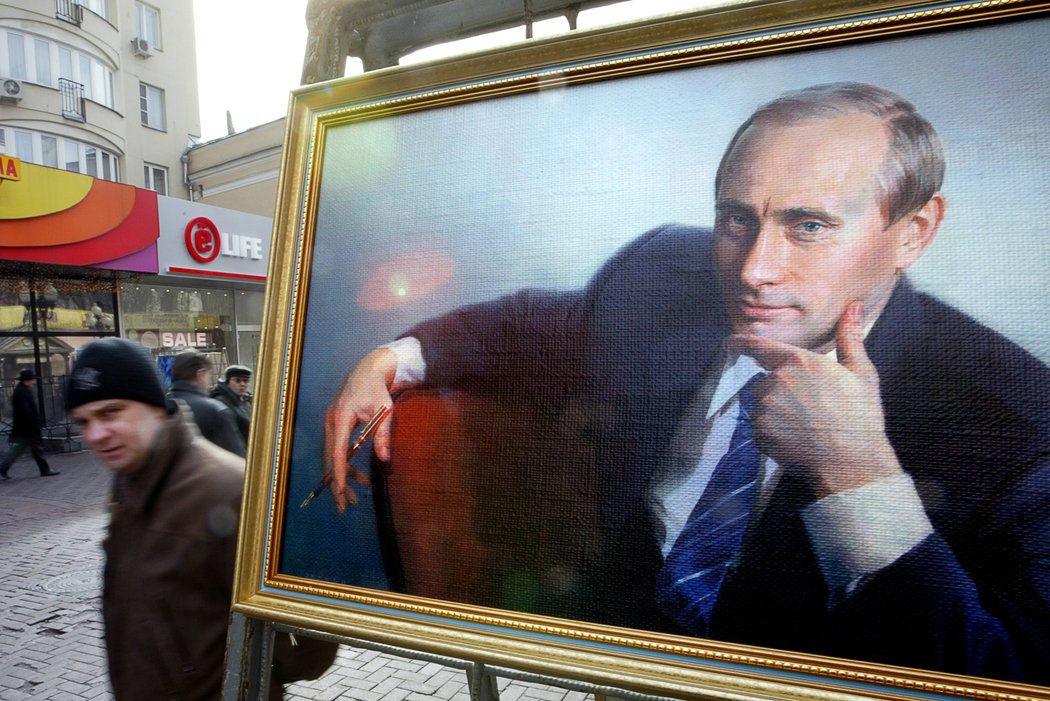|
There is something mystifying about the American obsession with Vladimir Putin’s Russia. The Kremlin’s annexation of the Crimean peninsula, its military involvement in Syria and its meddling in elections abroad may help explain some of America’s sense of alarm. But they fail to explain why liberals in the United States are so much more vexed by Russia than they are by, say, the growing economic power and geopolitical ambitions of China, or the global ideological challenge of radical Islam or the sheer craziness of a nuclear-armed North Korea.
美国人一直执着于弗拉基米尔·普京(Vladimir Putin)领导下的俄罗斯,而这有些令人百思不得其解。克里姆林宫吞并克里米亚半岛、武力干涉叙利亚、干扰他国大选——这些也许可以帮助解释美国人对俄罗斯感到警惕的部分原因。但不能解释为什么美国的自由派更为俄罗斯感到恼火,而非中国日益增长的经济实力和地缘政治野心,或者激进伊斯兰教徒的全球意识形态挑战,又或者拥有核武器的朝鲜的疯狂表现。
Russia suffers from demographic decline and arrested modernization. Its economy is overdependent on exporting natural resources. Its population has one of the highest percentages of university-educated people but the lowest labor productivity in the industrialized world. And although Mr. Putin is a strong and ruthless leader who enjoys popular support at home and celebrity status abroad, Russia’s institutions are corrupt and dysfunctional: Russian bureaucrats spend much of their energy fighting one another over money and power and have no time to cooperate. And Russia’s future after Mr. Putin — whenever that may come — is anybody’s guess.
俄罗斯的人口在减少,现代化进程遭遇阻碍。它的经济过度依赖出口自然资源。它的人口接受大学教育的比例数一数二,但在工业化国家中的劳动生产率最低。虽然普京是一位强悍冷酷的领导者,在国内拥有民众的支持,在国外拥有名人地位,但俄罗斯体制腐败,运行不畅:俄罗斯官僚花费大量精力内斗,争夺金钱和权力,无暇协作。普京之后的俄罗斯的未来无人知晓——不管那一天何时到来。
Was it not just two years ago that President Barack Obama called Russia a “regional power”? And is it not true that even today most experts concur that while Moscow is an aggressive military power interested in counterbalancing America’s influence in the world, it is no traditional “rising power”? As the eminent American historian Stephen Kotkin wrote last year in Foreign Affairs, “For half a millennium Russian foreign policy has been characterized by soaring ambitions that have exceeded the country’s capabilities.” It is no different today.
难道不是仅在两年前,贝拉克·奥巴马总统称俄罗斯是“地区大国”?难道不是甚至在今天,大部分专家都认为,虽然俄罗斯是一个具有侵略性的军事强国,有意制衡美国在全球的影响力,但它不是传统意义上的“崛起大国”?正如美国著名史学家斯蒂芬·科特金(Stephen Kotkin)去年在《外交》(Foreign Affairs)杂志上写的,“五百年来,俄罗斯外交政策的特点就是超过该国实力范畴的雄心大志。”现在依然如此。

莫斯科阿尔巴特大街,一名男子从俄罗斯总统弗拉基米尔·普京的画像前走过。
And yet despite all of this, Americans are mesmerized and terrified by Russia. Is it simply that for liberal America, “Russia” is a code name for “Donald Trump”?
但尽管如此,美国人依然对俄罗斯感到困惑和恐惧。仅仅是因为对自由派美国来说,“俄罗斯”是“唐纳德·特朗普”的代号吗?
As for many of the great questions of our times, an explanation can be found in Russian classical literature. In this case, Fyodor Dostoyevsky’s novella “The Double.” It is the story of a government clerk who winds up in the madhouse after meeting his doppelg"anger — a man who looks like him and speaks like him, but who displays all the charm and self-confidence that the tortured protagonist lacks. The doppelg"anger in Dostoyevsky’s story does not drive the protagonist insane just because they look alike but because he makes the protagonist realize what it is he doesn’t like about himself. And such it is with the United States and Russia today.
和这个时代面临的很多重大问题一样,我们可以从俄罗斯的古典文学中找出解释。比如,费奥多尔·陀思妥耶夫斯基(Fyodor Dostoyevsky)的小说《双重人格》(The Double)。小说讲述了一个政府职员在遇到自己的幽灵——一个长相和言谈都和他相似,但却表现出了备受煎熬的主人公所没有的魅力和自信的人——后,最终住进了精神病院的故事。在这个故事中,幽灵把主人公逼疯不仅仅是因为他们外貌相近,还因为他让主人公意识到不喜欢自己的什么地方。今天的美国和俄罗斯就是这样。
The Soviet Union terrorized the West for most of the 20th century in part because it was so radically different. There was ostensibly no God, no private property and no political pluralism. America could be Sovietized only by losing the war against Communism. Mr. Putin’s Russia, by contrast, frightens Americans because they know that the United States and Russia should be very different, but many of the pathologies present in Russia can also be found in the United States. What disturbs liberal America is not that Russia will run the world — far from it. Rather, the fear, whether liberals fully recognize it or not, is that the United States has started to resemble Russia.
20世纪的大部分时间里,苏联都令西方人心惶惶。这部分是因为它实在太不一样了。苏联表面上没有神,没有私人财产,没有多元政治。只有在对抗共产主义时战败,美国才会被苏联化。而相比之下,普京领导下的俄罗斯令美国人感到害怕是因为他们知道美国和俄罗斯应该非常不一样,但俄罗斯出现的很多病症,在美国也能找到。让自由主义的美国不安的,不是俄罗斯会统治世界,根本不是。美国民众的恐惧是,不管自由派是否完全意识到了,美国已经开始变得像俄罗斯了。
It was the Kremlin that for the past two decades tried to explain away its problems and failures by blaming foreign meddling. Now America is doing the same. Everything that liberal Americans dislike — Mr. Trump’s electoral victory, the reverse of the process of democratization in the world and the decline of American power — are viewed as the results of Mr. Putin’s plottings.
过去20年里,克里姆林宫试图通过指责外国干涉,来为自己的问题和失败辩解。现在,美国正在做同样的事。美国的自由派不喜欢的一切——特朗普的当选、世界民主化进程的倒退和美国实力的衰落——都被视作是普京的阴谋造成的。
For liberal Americans, Russia is — rightfully — a frightening example of how authoritarian rule can function within the institutional framework of a democracy. Russia’s “managed democracy” provides a vivid illustration of how institutions and practices that originally emancipated citizens from the whim of unaccountable rulers can be refashioned to effectively disenfranchise citizens (even while allowing them to vote).
对美国的自由派来说,俄罗斯是威权主义统治在民主国家的体制框架内正常运转的骇人案例。这种想法是合理的。俄罗斯的“可控民主”(managed democracy)生动地表明,可以重新设计起初是把公民从不负责任的统治者的冲动中解放出来的制度和做法,以便有效地剥夺公民的权利(甚至是在允许他们选举的同时)。
Russia also embodies what politics can look like when the elites are completely divorced from the people. It is not only a highly unequal society but also one in which rising inequality is normal, and a handful of very rich and politically unaccountable rulers have managed to stay on top without having to use much violence. The privileged few do not need to dominate or control their fellow citizens; they can simply ignore them like an irrelevant nuisance.
俄罗斯也代表着政治在精英阶层完全脱离民众时可能会呈现的面貌。届时,社会不仅高度不公平,而且不平等现象日渐加剧会成为常态,少数非常富有并且在政治上不受控制的统治者无需使用很多暴力,就能够保住权力。享有特权的少许人无需主导或控制其他公民,完全可以忽略他们,就像面对无关重要的恼人飞虫一样。
It may take a while before working-class Americans start to realize that while the American economy is dramatically different from that of Russia, the technological revolution led by Silicon Valley could in time tilt Western societies toward authoritarian politics in the same way that an abundance of natural resources has made Mr. Putin’s regime possible. Robots — not unlike post-Soviet citizens — are not that interested in democracy.
美国的工薪阶层可能要过一段时间才开始意识到,尽管美国经济和俄罗斯经济大不相同,但硅谷领导的科技革命或许会在将来促使西方社会偏向威权主义政治,就像丰富的自然资源使普京的政权成为现实。机器人——和后苏联时代的民众一样——对民主不感兴趣。
For many years, Americans were able to look at Russia and its social and political problems and see a country stuck in the past, perhaps someday to develop into a modern country like the United States. But that’s no longer the prevailing attitude. Now, whether they realize it or not, many Americans fear that when they look at Russia they are looking at the future. What is most disturbing is that it could be their future, too.
在很多年里,美国民众看俄罗斯和它的社会及政治问题时,都认为这个国家停留在过去,也许有一天会发展成一个像美国这样的现代国家。但这已经不再是流行的态度了。现在,无论是否意识到了,很多美国人担心他们在看俄罗斯时,看到的是未来。最令人不安的是,这也可能是他们的未来。
伊万·克拉斯捷夫(Ivan Krastev)是观点作者、自由战略中心(Center for Liberal Strategies)主席、维也纳人类科学学院(Institute for Human Sciences)的常任研究员,近期著有《After Europe》一书。
|
- VOA 英语教学节目
-
- 经典英语在线训练资源
-
|

